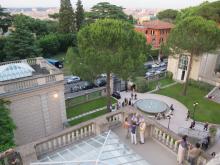by Stephen Hinds
Grace Funsten (PhCand) and Adriana Vazquez (PhD '17) are among the five Ancient Studies winners, and the 32 winners across the arts and humanities at large, of the 2021-22 Rome Prize, which brings together scholars and artists for year-long residential fellowships in the American Academy in Rome, beautifully situated high on the Gianicolo.
Grace's project is titled 'En versus facio: Rewriting Augustan Elegy in Latin Epitaphs, Maximianus, & Louise Labé,' and considers how Roman elegy, a genre known for its innovation and challenges to the status quo, transforms across different historical and cultural circumstances. In the unique polyphony of Grace's dissertation, dead human (and animal!) voices speak from the funeral monuments of the city of Rome, an elusive male figure worries about cultural change in the western Empire of the mid-500s, and a well-connected female author speaks out for her sex, in French, in sixteenth-century Lyon.
Adriana since leaving Seattle has been Assistant Professor of Classics at UCLA. Her Rome Prize project, titled 'Window Reception: Brazilian Neoclassical Poetry and Lusophone Classics Across the Atlantic,' positions itself within a burgeoning subfield which, investigating the legacy of classical antiquity beyond the boundaries of the Mediterranean, is finding ways to decolonize the history of the classical tradition. Her monograph sets out to navigate colonial Brazilian, Portuguese and Latin poetry in pursuit of the literary movement of Brazilian Arcadianism, developed by the poets of the so-called Minas School (A Escola Mineira), active during the eighteenth century; the identities of these poets, educated in Jesuit schools in Brazil and at the University of Coimbra in Portugal, were shaped by an engagement with Italian literary societies, most notably the Roman Accademia degli Arcadi. Adriana's project promises to illuminate the earliest stage of an emerging national literature at the temporal and geographical limits of empire.
The department is excited to celebrate this double triumph of graduate students past and present!
